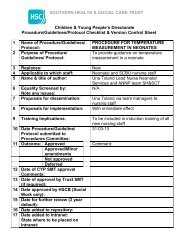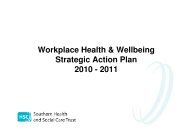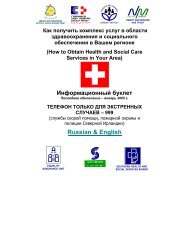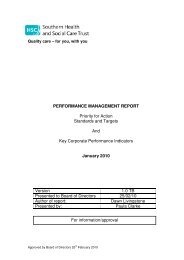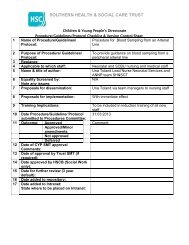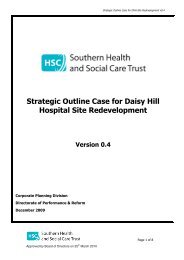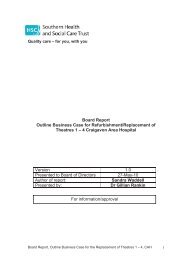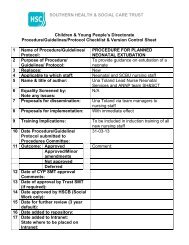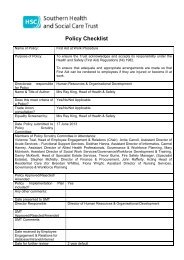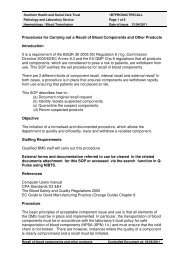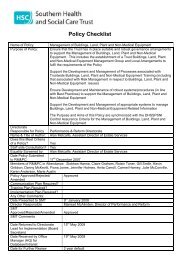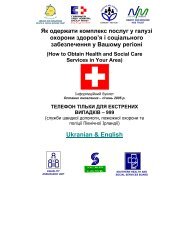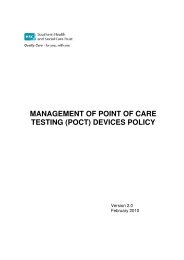Domestic Violence Policy and Procedure - Southern Health and ...
Domestic Violence Policy and Procedure - Southern Health and ...
Domestic Violence Policy and Procedure - Southern Health and ...
Create successful ePaper yourself
Turn your PDF publications into a flip-book with our unique Google optimized e-Paper software.
<strong>Policy</strong> <strong>and</strong> <strong>Procedure</strong> for the<br />
Management of <strong>Domestic</strong> Abuse<br />
Presentations in the <strong>Southern</strong> <strong>Health</strong><br />
& Social Care Trust<br />
Author: Ruth Donaldson Head of Acute Hospital Social Work<br />
Patricia McStay Head of Midwifery <strong>and</strong> Gynaecology<br />
Mary McIntosh Assistant Director of Social Work<br />
Directorate Responsible: Across Directorates<br />
Draft Version 3: August 2010<br />
<strong>Policy</strong> <strong>and</strong> <strong>Procedure</strong> for the Management of <strong>Domestic</strong> Abuse Presentations in the<br />
<strong>Southern</strong> <strong>Health</strong> <strong>and</strong> Social Care Trust<br />
1
Name of <strong>Policy</strong> <strong>and</strong> procedure:<br />
Purpose of <strong>Policy</strong> <strong>and</strong> procedure:<br />
Directorate Responsible for <strong>Policy</strong> <strong>and</strong><br />
<strong>Procedure</strong><br />
Name <strong>and</strong> Title of Author:<br />
<strong>Policy</strong> Checklist<br />
Does this meet criteria for <strong>Policy</strong><br />
Staff side consultation? Yes – June 2010<br />
Equality Screened by:<br />
Date <strong>Policy</strong> <strong>and</strong> procedure Submitted<br />
to RM&PC:<br />
Members of RM & PC in attendance:<br />
<strong>Policy</strong> & <strong>Procedure</strong> for the<br />
Management of <strong>Domestic</strong> Abuse<br />
Presentations in the <strong>Southern</strong> <strong>Health</strong><br />
<strong>and</strong> Social Care Trust<br />
To ensure that health & social care<br />
staff are informed about <strong>Domestic</strong><br />
Abuse <strong>and</strong> its affect. This policy <strong>and</strong><br />
procedure seeks to outline to staff their<br />
responsibilities <strong>and</strong> provide guidance<br />
as to how to respond to domestic<br />
abuse<br />
Across Directorates<br />
Ruth Donaldson, Head of Acute<br />
Hospital Social Work &<br />
Patricia McStay, Head Of Midwifery<br />
<strong>and</strong> Gynaecology & Mary McIntosh<br />
Assistant Director of Social Work<br />
Yes<br />
<strong>Policy</strong> <strong>and</strong> <strong>Procedure</strong> authors in<br />
consultation with Lynda Gordon<br />
Equality Manager SHSCT – May 2010<br />
14.6.2010<br />
Kieran Donaghy, Director Human<br />
Resources & Organisational<br />
Development<br />
Vivienne Toal, Head of Employee<br />
Engagement & Relations<br />
Claudine McComiskey, Head of<br />
Domiciliary Care<br />
Danny McKevitt, Head of Specialist<br />
Estate Services<br />
John Graham, Trade Union Side<br />
Anita Carroll, Assistant Director of<br />
Functional Support Services<br />
<strong>Policy</strong> <strong>and</strong> <strong>Procedure</strong> for the Management of <strong>Domestic</strong> Abuse Presentations in the<br />
<strong>Southern</strong> <strong>Health</strong> <strong>and</strong> Social Care Trust<br />
2
Mary McIntosh, Assistant Director<br />
Social Work Governance<br />
Fiona Wright, Assistant Director of<br />
Nursing Governance<br />
Carmel Harney, Assistant Director of<br />
AHP Governance<br />
Dessie Cunningham, Learning<br />
Disability Supported Living Services<br />
Manager<br />
Claire Graham, Head of Corporate<br />
Records<br />
Stephen McNally, Acting Director of<br />
Finance & Procurement<br />
Roberta Wilson, Senior Manager<br />
Patient & Client Safety<br />
<strong>Policy</strong> <strong>and</strong> procedure<br />
Approved/Rejected/Amended<br />
Communication Plan Required?<br />
Training Plan Required?<br />
Implementation Plan Required?<br />
Any other comments:<br />
Date presented to SMT:<br />
Director Responsible<br />
SMT Approved/Rejected/Amended<br />
SMT Comments<br />
Date returned to Directorate Lead for<br />
implementation (Board secretary)<br />
Date received by Board secretary for<br />
database/intranet/internet<br />
Date for further review<br />
Approved<br />
Yes<br />
Yes<br />
Yes<br />
Training, Communication <strong>and</strong><br />
Implementation Plan completed<br />
Dr Gillian Rankin<br />
POLICY AND PROCEDURE DOCUMENT – VERSION CONTROL SHEET<br />
Title<br />
Supersedes<br />
Title: <strong>Policy</strong> & <strong>Procedure</strong> for the<br />
Management of <strong>Domestic</strong> Abuse<br />
Presentations in the <strong>Southern</strong> <strong>Health</strong><br />
<strong>and</strong> Social Care Trust Version:3<br />
Reference number/document name:<br />
Supersedes: N/A<br />
Description of Amendments(s)/Previous<br />
<strong>Policy</strong> <strong>and</strong> procedure or Version: N/A<br />
<strong>Policy</strong> <strong>and</strong> <strong>Procedure</strong> for the Management of <strong>Domestic</strong> Abuse Presentations in the<br />
<strong>Southern</strong> <strong>Health</strong> <strong>and</strong> Social Care Trust<br />
3
Originator<br />
RM/<strong>Policy</strong> <strong>and</strong> procedure Committee & SMT<br />
approval<br />
Circulation<br />
Review<br />
Name of Author: Ruth Donaldson Head<br />
of Acute Hospital Social Work & Patricia<br />
McStay Head of Midwifery <strong>and</strong><br />
Gynaecology & Mary McIntosh<br />
Assistant Director of Social Work<br />
Referred for approval by:<br />
Date of Referral:<br />
RM/<strong>Policy</strong> <strong>and</strong> procedure Committee<br />
Approval (Date)<br />
SMT approval (Date)<br />
Issue Date:<br />
Circulated By:<br />
Issued To: As per circulation List<br />
(details below)<br />
Review Date:<br />
Responsibility of (Name):<br />
Title:<br />
<strong>Policy</strong> <strong>and</strong> <strong>Procedure</strong> for the Management of <strong>Domestic</strong> Abuse Presentations in the<br />
<strong>Southern</strong> <strong>Health</strong> <strong>and</strong> Social Care Trust<br />
4
Contents<br />
<strong>Policy</strong><br />
Page No<br />
1. Introduction 6<br />
2. Purpose <strong>and</strong> Aims 6<br />
3. <strong>Policy</strong> Statement 6<br />
4. Scope of <strong>Policy</strong> 6-7<br />
5. Responsibilities 7<br />
6. Definition 8<br />
7. Legislative Compliance, Relevant <strong>Policy</strong> & <strong>Procedure</strong>s & Guidance 8-11<br />
8. Equality <strong>and</strong> Human Rights Considerations 11<br />
<strong>Procedure</strong><br />
1. Facts about <strong>Domestic</strong> Abuse 12<br />
2. Male victims of <strong>Domestic</strong> Abuse 12<br />
3. Indicators of <strong>Domestic</strong> Abuse 13<br />
4. Responding to <strong>Domestic</strong> Abuse 14<br />
5. Children <strong>and</strong> Young People in a <strong>Domestic</strong> <strong>Violence</strong> Situation 14-15<br />
6. Completion of UNOCINI 15<br />
7. Vulnerable Adults 15-16<br />
8. Confidentiality 16<br />
9. Recording 17<br />
10. Routine Enquiry 17-18<br />
11. <strong>Domestic</strong> <strong>Violence</strong> <strong>and</strong> A&E 18<br />
12. <strong>Domestic</strong> <strong>Violence</strong> <strong>and</strong> Mental <strong>Health</strong> 18-19<br />
13. Working Cross Culturally 19<br />
14. Training & Support 20<br />
15. Staff Safety 20-21<br />
Appendices<br />
Appendix 1 Resources available for male victims of domestic abuse<br />
Appendix 2 Resources available for female victims of domestic abuse<br />
Appendix 3 <strong>Domestic</strong> abuse presentation flowchart<br />
Appendix 4 Routine enquiry for domestic abuse<br />
Appendix 5 Resources available for victims of domestic abuse. Information<br />
written in Polish, Russian, Portuguese, Lithuanian & Tetum. (English version<br />
included)<br />
<strong>Policy</strong> <strong>and</strong> <strong>Procedure</strong> for the Management of <strong>Domestic</strong> Abuse Presentations in the<br />
<strong>Southern</strong> <strong>Health</strong> <strong>and</strong> Social Care Trust<br />
5
<strong>Policy</strong> for the Management of <strong>Domestic</strong> Abuse<br />
Presentations in the <strong>Southern</strong> <strong>Health</strong> <strong>and</strong> Social Care<br />
Trust<br />
1.0 Introduction to the <strong>Policy</strong><br />
<strong>Domestic</strong> abuse is a priority across government. It is essential that a coordinated<br />
inter-agency <strong>and</strong> multi-disciplinary approach is adopted to effectively<br />
address the issue.<br />
This <strong>Policy</strong> is for health <strong>and</strong> social care staff in the <strong>Southern</strong> <strong>Health</strong> &Social Care<br />
Trust (SH&SCT) <strong>and</strong> outlines their responsibilities in relation to presentations of<br />
domestic abuse. This <strong>Policy</strong> is based upon the Area Child Protection<br />
Committees‟ Regional <strong>Policy</strong> <strong>and</strong> <strong>Procedure</strong>s 2005, amended in 2008. The<br />
DHSSPS issued a circular 12.10.06 re routine enquiry on domestic violence<br />
which should be read in conjunction with this policy as should the DOH h<strong>and</strong>book<br />
„Responding to <strong>Domestic</strong> Abuse December 2005‟.<br />
Throughout this <strong>Policy</strong> the term <strong>Domestic</strong> Abuse is used instead of<br />
<strong>Domestic</strong> <strong>Violence</strong>, as the latter may be interpreted as physical abuse only.<br />
2.0 Purpose <strong>and</strong> Aims<br />
The aims of this <strong>Policy</strong> are to ensure health <strong>and</strong> social care staff in the Trust are<br />
informed about domestic abuse <strong>and</strong> its effects. In addition the <strong>Policy</strong> will outline<br />
to staff their professional responsibilities.<br />
3.0 <strong>Policy</strong> Statement<br />
The Trust recognises that domestic abuse occurs across the whole of society<br />
regardless of race, ethnicity, religion, disability, age, class, income, gender <strong>and</strong><br />
sexuality. All staff involved in health or social care may experience presentations<br />
of domestic abuse. Staff should comply with the Regional Child Protection <strong>Policy</strong><br />
<strong>and</strong> <strong>Procedure</strong>s 2005, Vulnerable Adult Regional <strong>Policy</strong> <strong>and</strong> <strong>Procedure</strong> 2006 <strong>and</strong><br />
also their own relevant code of professional conduct.<br />
4.0 Scope of the <strong>Policy</strong><br />
This policy applies to all health <strong>and</strong> social care Trust staff who are in direct<br />
contact with patients/clients accessing the services of the <strong>Southern</strong> Trust, for<br />
example medical, nursing/midwifery staff, allied health professionals <strong>and</strong> social<br />
workers. Other staff groups may also have direct contact with service users, for<br />
example porters <strong>and</strong> domiciliary care staff. If domestic abuse is disclosed to<br />
support staff this should be reported to the relevant professional with<br />
<strong>Policy</strong> <strong>and</strong> <strong>Procedure</strong> for the Management of <strong>Domestic</strong> Abuse Presentations in the<br />
<strong>Southern</strong> <strong>Health</strong> <strong>and</strong> Social Care Trust<br />
6
esponsibility for the patient/client. This <strong>Policy</strong> provides specific guidance with<br />
regard to responses to presentations of domestic abuse or suspected domestic<br />
abuse, outlining the needs of the individual within the context of their family <strong>and</strong><br />
the support that they may require.<br />
5.0 Responsibilities<br />
5.1 Chief Executive<br />
The Trust Chief Executive as Accountable Officer has overall responsibility for<br />
ensuring the aims of this <strong>Policy</strong> <strong>and</strong> <strong>Procedure</strong> are met.<br />
5.2 Director of Acute <strong>and</strong> Executive Director of Social Work<br />
Lead responsibility for <strong>Policy</strong> <strong>and</strong> <strong>Procedure</strong> monitoring <strong>and</strong> review lies with the<br />
Director of Acute <strong>and</strong> Executive Director of Social Work. It is the responsibility of<br />
the Director of Acute to distribute this <strong>Policy</strong> <strong>and</strong> <strong>Procedure</strong> to all other<br />
Directorates within the Trust. It is then the responsibility of those Directorates to<br />
make their staff aware of this <strong>Policy</strong> <strong>and</strong> <strong>Procedure</strong>.<br />
5.3 Assistant Directors, Head of Service <strong>and</strong> Senior Managers<br />
Assistant Directors, Heads of Service <strong>and</strong> Senior Managers have responsibility<br />
for the effective application of this <strong>Policy</strong> <strong>and</strong> <strong>Procedure</strong>.<br />
5.4 Assistant Director of Safeguarding <strong>and</strong> Family Support<br />
It is the responsibility of the Assistant Director of Safeguarding <strong>and</strong> Family<br />
Support to distribute this <strong>Policy</strong> <strong>and</strong> <strong>Procedure</strong> to all agency colleagues on the<br />
SHSCT Child Protection Panel.<br />
5.5 <strong>Health</strong> <strong>and</strong> Social Care staff<br />
It is the responsibility of all medical, nursing/midwifery, social work <strong>and</strong> allied<br />
health professionals to be familiar with this <strong>Policy</strong> <strong>and</strong> <strong>Procedure</strong> <strong>and</strong> adhere to<br />
it. Those staff who are in direct contact with the patient/client have a<br />
responsibility to adhere to the principles <strong>and</strong> aims of this <strong>Policy</strong> <strong>and</strong> <strong>Procedure</strong><br />
<strong>and</strong> take appropriate action as outlined in sections 4, 5, 6 & 7 of the <strong>Procedure</strong>.<br />
Children who live in a home where domestic abuse occurs may be defined as a<br />
child in need as outlined in the Children (NI) Order 1995. There is a strong<br />
correlation between the incidences of domestic abuse <strong>and</strong> child abuse <strong>and</strong> given<br />
this all professionals must be alert to the likelihood that child protection issues<br />
may be present.<br />
<strong>Policy</strong> <strong>and</strong> <strong>Procedure</strong> for the Management of <strong>Domestic</strong> Abuse Presentations in the<br />
<strong>Southern</strong> <strong>Health</strong> <strong>and</strong> Social Care Trust<br />
7
6.0 Definition<br />
For the purposes of this <strong>Policy</strong> <strong>and</strong> <strong>Procedure</strong> the definition of domestic violence<br />
<strong>and</strong> abuse which is being used is the one outlined by the Department of <strong>Health</strong>,<br />
Social Service <strong>and</strong> Public Safety in their document Tackling <strong>Violence</strong> At Home<br />
(2005);<br />
“threatening behaviour, violence or abuse (psychological, physical, verbal,<br />
sexual, financial or emotional) inflicted on one person by another where they are,<br />
or have been, intimate partners or family members, irrespective of gender or<br />
sexual orientation.”<br />
7.0 Legislation <strong>and</strong> Policies Pertaining to <strong>Domestic</strong> Abuse<br />
Professionals need to take account of the following legislation when considering<br />
the needs of the family who live with domestic violence <strong>and</strong> abuse.<br />
The Family Homes <strong>and</strong> <strong>Domestic</strong> <strong>Violence</strong> (Northern Irel<strong>and</strong>) Order (1998)<br />
The Family Homes <strong>and</strong> <strong>Domestic</strong> <strong>Violence</strong> (Northern Irel<strong>and</strong>) Order (1998)<br />
tackles two separate but inter-related problems; providing protection for one<br />
family member against violence or molestation by another <strong>and</strong> regulating<br />
occupation of the family home where a relationship has broken down.<br />
Article 28 inserts a new article into the Children Order (Article 12A) to ensure<br />
that where there has been domestic violence in a home, the court must consider<br />
the risk of harm to the child witnessing domestic violence before making a<br />
residence or contact order.<br />
With respect to Non-Molestation Orders they may be made by any court <strong>and</strong> do<br />
not require proof of physical violence.<br />
Article 29 inserts two new articles into the Children Order (Articles 57A <strong>and</strong> 63A)<br />
which give a court the power to remove a suspected abuser from the family home<br />
instead of removing the child under an Interim Care Order or Emergency<br />
Protection Order.<br />
With respect to Occupation Orders the court must consider:<br />
Housing Needs<br />
Financial Resources<br />
Effects on <strong>Health</strong> <strong>and</strong> Safety<br />
Conduct towards each-other<br />
Breach of Orders made for protective purposes is a criminal offence <strong>and</strong> an<br />
arrest without warrant can be made (Part 111 Safeguarding Vulnerable Adults -<br />
Regional Adult Protection <strong>Policy</strong> <strong>and</strong> Procedural Guidance 2006).<br />
<strong>Policy</strong> <strong>and</strong> <strong>Procedure</strong> for the Management of <strong>Domestic</strong> Abuse Presentations in the<br />
<strong>Southern</strong> <strong>Health</strong> <strong>and</strong> Social Care Trust<br />
8
The Law Reform (Miscellaneous Provisions) Northern Irel<strong>and</strong>) Order 2005<br />
Part 111 incorporates amendments to the Family Homes <strong>and</strong> <strong>Domestic</strong> <strong>Violence</strong><br />
(Northern Irel<strong>and</strong>) Order 1998: which outlines:<br />
“Cohabitees” to include same-sex couples.<br />
This has been referenced in this <strong>Policy</strong> <strong>and</strong> <strong>Procedure</strong> in terms of the definition of<br />
domestic abuse, please refer to section 6.<br />
The Children (NI) Order 1995<br />
The Children (NI) Order 1995 provides the legislative base for protection <strong>and</strong><br />
support of children <strong>and</strong> their families. The majority of children who have<br />
experienced domestic abuse meet the definition of „children in need‟ as outlined<br />
within the Children (NI) Order 1995 (Para 9.56 Regional Child Protection <strong>Policy</strong><br />
<strong>and</strong> <strong>Procedure</strong>s 2005). Research findings have clearly highlighted a correlation<br />
between the incidence of domestic abuse <strong>and</strong> child abuse. Given this,<br />
professionals must be alert to the likelihood that child protection issues may be<br />
present (Para 9.56 Regional Child Protection <strong>Policy</strong> <strong>and</strong> <strong>Procedure</strong>s 2005).<br />
Area Child Protection Committee Child Protection <strong>Policy</strong> <strong>and</strong> <strong>Procedure</strong>s<br />
2005 amended 2008<br />
Chapter 9 “Child Protection in Specific Circumstances”, outlines the impact of<br />
domestic abuse, legislation <strong>and</strong> the actions to be taken. Section 9.60 relates that<br />
where there are grounds to believe that a child is suffering or likely to suffer<br />
significant harm, a referral must be made to Social Services, the NSPCC or the<br />
Police. Section 9.61 provides example of situations where implementation of the<br />
child protection procedures should be considered: where there is a child present<br />
at the time of a domestic violence incident, where a child is injured as a result of<br />
domestic violence, where there is serious injury or hospitalisation of a victim<br />
following domestic violence, where there is previous knowledge of domestic<br />
violence <strong>and</strong> the non-abusing parent has had to leave without the child. Case<br />
Management Reviews also recognize the dangers for children <strong>and</strong> young people<br />
who raise the alarm. In the Acute setting the ACPC Regional <strong>Policy</strong> <strong>and</strong><br />
<strong>Procedure</strong>s are enacted via the Hospital Social Work Department, or the Out of<br />
Hours social work service. Further guidance re the referral process is found in<br />
sections 4, 5 <strong>and</strong> 6 of the <strong>Procedure</strong> section of this document.<br />
Safeguarding Vulnerable Adults – Regional Adult Protection <strong>Policy</strong> <strong>and</strong><br />
Procedural Guidance 2006<br />
Any adult at risk of abuse, exploitation or neglect should be able to access<br />
support to enable them to live a life free from violence <strong>and</strong> abuse. The Regional<br />
Adult Protection <strong>Policy</strong> <strong>and</strong> <strong>Procedure</strong>s detail the processes that must be<br />
followed in the event of a suspicion or allegation that a vulnerable adult is at risk<br />
of abuse, exploitation or neglect (1.1). A vulnerable adult is defined as:<br />
<strong>Policy</strong> <strong>and</strong> <strong>Procedure</strong> for the Management of <strong>Domestic</strong> Abuse Presentations in the<br />
<strong>Southern</strong> <strong>Health</strong> <strong>and</strong> Social Care Trust<br />
9
“a person aged 18 years or over who is, or may be, in need of community care<br />
services or is resident in a continuing care facility by reason of mental or other<br />
disability, age or illness or who is, or may be, unable to take care of him or<br />
herself or unable to protect him or herself against significant harm or exploitation”<br />
(3.1).<br />
Section 13.17 of the Regional <strong>Policy</strong> <strong>and</strong> <strong>Procedure</strong> outlines the actions which<br />
staff should take in an A&E Department or whilst the victim is a hospital inpatient.<br />
“…if there is a concern or allegation of abuse, the hospital staff have a duty to<br />
alert their line manager. The line manager should refer to the Designated Officer<br />
for the hospital who will, in turn, liaise with the appropriate Designated Officer in<br />
the community to determine who will take the lead role in the investigation”. In<br />
the Acute setting the Regional <strong>Policy</strong> <strong>and</strong> <strong>Procedure</strong>s are enacted via the<br />
Hospital Social Work Department, or the Out of Hours social work service. The<br />
policy <strong>and</strong> procedure continues that is essential that a Care <strong>and</strong> Protection Plan<br />
is in place before the patient is discharged.<br />
When offering support to an adult victim, there is a need to be mindful of the<br />
impact of domestic abuse on others, especially children, older people, those from<br />
an ethnic minority group <strong>and</strong> those who are disabled or vulnerable. These<br />
groupings may be less able to protect themselves <strong>and</strong> voice their concerns.<br />
The professionals involved in the protection of vulnerable adults in a domestic<br />
abuse situation, will have to give consideration to the legislative basis for<br />
intervention, which may include a number of different policies <strong>and</strong> procedures<br />
<strong>and</strong> areas of legislation.<br />
The Human Rights Act 1998<br />
The Human Rights Act 1998 places a positive obligation in respect for human<br />
rights. When considering the needs of families living with domestic violence <strong>and</strong><br />
abuse, the principles of the Act should be applied to all policy <strong>and</strong> procedure<br />
choices, activities <strong>and</strong> use of power. Provisions within the European Convention<br />
on Human Rights include the following:<br />
Article 2: the right to life<br />
Article 3: freedom from torture or inhuman or degrading treatment or punishment<br />
Article 8 the right to respect for private <strong>and</strong> family life, home <strong>and</strong> correspondence.<br />
Children <strong>and</strong> Young People who Perpetrate <strong>Violence</strong> in the Home<br />
It is recognised that children <strong>and</strong> young people can not only be the victims but<br />
the perpetrators of domestic violence <strong>and</strong> abuse. This may be through forced<br />
involvement to commit violence, negative role modelling or as a result of stress in<br />
<strong>Policy</strong> <strong>and</strong> <strong>Procedure</strong> for the Management of <strong>Domestic</strong> Abuse Presentations in the<br />
<strong>Southern</strong> <strong>Health</strong> <strong>and</strong> Social Care Trust<br />
10
the home situation. Children can abuse other children or adults in the family<br />
home. The professional involved needs to be aware of the combination of<br />
legislation, policy <strong>and</strong> procedures which pertain to the needs of the child <strong>and</strong> the<br />
adult in this instance. Children <strong>and</strong> Young People who perpetrate acts of abuse<br />
are also children <strong>and</strong> young people in need <strong>and</strong> will require social work<br />
intervention <strong>and</strong> support.<br />
8.0 Equality <strong>and</strong> Human Rights Considerations<br />
This <strong>Policy</strong> <strong>and</strong> <strong>Procedure</strong> has been screened for equality implications as<br />
required by Section 75, Schedule 9, of the Northern Irel<strong>and</strong> Act, 1988. Equality<br />
Commission of Northern Irel<strong>and</strong> Guidance states that the purpose of screening is<br />
to identify those policies which are likely to have a significant impact on equality<br />
of opportunity so that greatest resources can be targeted at them.<br />
Using the Equality Commission‟s screening criteria no significant equality<br />
implications have been identified. This <strong>Policy</strong> <strong>and</strong> <strong>Procedure</strong> will therefore not be<br />
subject to an equality impact assessment.<br />
This <strong>Policy</strong> <strong>and</strong> <strong>Procedure</strong> has been considered under the terms of the Human<br />
Rights Act, 1998 <strong>and</strong> was deemed to be compatible with the European<br />
Convention of Human Rights contained in that Act. This <strong>Policy</strong> <strong>and</strong> <strong>Procedure</strong><br />
will be included in the Trust‟s register of screening documentation <strong>and</strong><br />
maintained for inspection while it remains in force.<br />
<strong>Policy</strong> <strong>and</strong> <strong>Procedure</strong> for the Management of <strong>Domestic</strong> Abuse Presentations in the<br />
<strong>Southern</strong> <strong>Health</strong> <strong>and</strong> Social Care Trust<br />
11
<strong>Procedure</strong> for the Management of <strong>Domestic</strong> Abuse<br />
Presentations in the SHSCT<br />
1.0 Facts about <strong>Domestic</strong> Abuse<br />
1.1 <strong>Domestic</strong> abuse affects as many as 1 in 4 women during their lifetime <strong>and</strong><br />
can affect women of different ages, race, class, sexuality, culture, religion <strong>and</strong><br />
mental <strong>and</strong> physical abilities.<br />
1.2 Men from all socio-economic groups can be the perpetrators of violence<br />
against women they know.<br />
1.3 <strong>Domestic</strong> abuse can also occur in same sex relationships. <strong>Domestic</strong> abuse<br />
can include violence by a son, daughter or any other person who has a close or<br />
blood relationship with the victim.<br />
1.4 Whilst it is widely acknowledged that females are the primary victim of<br />
domestic abuse, men may also be victims. This concept is further explored in<br />
section 2 of this procedure.<br />
1.5 <strong>Domestic</strong> abuse can have physical, emotional <strong>and</strong> social effects on children<br />
<strong>and</strong> young people as they also can be the direct victims of domestic abuse in<br />
their relationships.<br />
<strong>Domestic</strong> violence accounts for ¼ of all violent crimes. <strong>Domestic</strong> violence has<br />
the highest rate of repeat victimisation of all crimes <strong>and</strong> it is acknowledged that<br />
women experience 35 incidents before asking for help. The severity of domestic<br />
violence is represented in the fact that 2 women are killed by their present or<br />
former partner in the UK each week. There are specific support organizations<br />
which assist female victims. Please refer to Appendix 2 for details. Child abuse<br />
is 15 times more likely where domestic violence exists. It is believed that 40-69%<br />
of children are physically abused in the context of domestic abuse <strong>and</strong> 15-30% of<br />
children are sexually abused in the context of domestic abuse. The victim is still<br />
at risk when separated from their partner. The British Crime Survey noted that<br />
36% of domestic violence incidents occurred when the couple were no longer<br />
together.<br />
2.0 Male Victims of <strong>Domestic</strong> Abuse<br />
Trust staff have to be aware that domestic abuse is not gender specific.<br />
<strong>Domestic</strong> abuse can be targeted at both males <strong>and</strong> females.<br />
On average, every day in Northern Irel<strong>and</strong>, 4-5 men are victims of crimes with a<br />
domestic motivation (PSNI 2007/08). It is estimated that 1 in 9 men experience<br />
domestic abuse in the course of their lifetime (NICS 2003/04). Men are less<br />
likely than women to recognize that they are victims or report domestic abuse<br />
(NICS 2005). There are specific support organizations which assist male victims.<br />
Please refer to Appendix 1 for details. Many of the agencies referenced in<br />
Appendix 2 provide a support service to both female <strong>and</strong> male victims.<br />
<strong>Policy</strong> <strong>and</strong> <strong>Procedure</strong> for the Management of <strong>Domestic</strong> Abuse Presentations in the<br />
<strong>Southern</strong> <strong>Health</strong> <strong>and</strong> Social Care Trust<br />
12
3.0 Indicators of <strong>Domestic</strong> Abuse<br />
It is widely recognised that domestic abuse manifests itself in different forms.<br />
Responding to <strong>Domestic</strong> Abuse - A H<strong>and</strong>book for <strong>Health</strong> Professionals, DOH<br />
2006 outlines physical <strong>and</strong> psychological effects of domestic abuse <strong>and</strong> should<br />
be read in conjunction with this <strong>Policy</strong> <strong>and</strong> <strong>Procedure</strong>. Medical staff <strong>and</strong> General<br />
Practitioners should also reference the BMA <strong>Domestic</strong> Abuse Report June 2007.<br />
There are four main types of domestic abuse;<br />
Physical, injuries sustained especially among women, include bruising or black<br />
eyes, scratches, bleeding from cuts, internal injuries <strong>and</strong> broken bones or teeth.<br />
Male victims may have a weapon used against them or be attacked in their sleep.<br />
Sexual, where physical force could be used or the women has been drugged,<br />
unconscious or is incapable of consent. Long-term sexual abuse may increase a<br />
women‟s risk of urogenital infections <strong>and</strong> chronic pelvic pain. Globally between<br />
6-47% of adult women report being sexually assaulted by intimate partners in<br />
their lifetime. Forced or coercive sexual intercourse with an HIV infected partner<br />
is one of the most common routes of transmission of HIV <strong>and</strong> other sexually<br />
transmitted diseases (BMA Board of Science: 2007)<br />
Psychological, it is known that domestic abuse has long-term consequences on<br />
the mental health of its victims. It is known that depression, psychological<br />
symptoms of somatisation, anxiety, obsessive compulsive symptoms <strong>and</strong> the<br />
tendency to be paranoid are commonly found in female victims of domestic<br />
abuse. Please refer to Section 12 of this <strong>Procedure</strong> for further information. Male<br />
victims of domestic abuse are also at risk of increased depression.<br />
Financial, financial abuse is more commonly seen in older people as they may<br />
be more reliant on others to organise their finances. The older population may<br />
suffer more serious consequences from financial abuse than younger people as<br />
they are often more vulnerable to be taken advantage of. Elder financial abuse is<br />
very difficult to diagnose due to the lack of physical symptoms <strong>and</strong> therefore it is<br />
thought that it remains heavily under-reported.<br />
Manifestations of domestic abuse may include; bruising, readmissions or repeat<br />
contacts with health <strong>and</strong> social care professionals, miscarriage, premature birth,<br />
self-harming behaviour, increasing likelihood of misusing drugs, alcohol or<br />
prescribed anti-depressants, depression/poor mental health, loss of selfconfidence,<br />
presentation of neglect, feelings of dependency <strong>and</strong> eating disorders.<br />
Professionals have to be alert to inconsistent explanations for injuries in both<br />
adults <strong>and</strong> children.<br />
<strong>Policy</strong> <strong>and</strong> <strong>Procedure</strong> for the Management of <strong>Domestic</strong> Abuse Presentations in the<br />
<strong>Southern</strong> <strong>Health</strong> <strong>and</strong> Social Care Trust<br />
13
4.0 Responding to <strong>Domestic</strong> Abuse<br />
(This is applicable to those with or without children)<br />
In working with victims of domestic abuse it is crucial to respond to the risk <strong>and</strong><br />
the needs of the victim. Staff should aim to provide privacy for discussion,<br />
ensure they are supportive, reassuring, <strong>and</strong> non-judgemental <strong>and</strong> give priority to<br />
ensuring the immediate safety of the victim <strong>and</strong> children <strong>and</strong> young people if<br />
applicable. The individual should be offered access to a telephone to contact<br />
other agencies, for example the PSNI <strong>and</strong> advised of the support services<br />
available. Constraints on confidentiality should be clearly explained, please refer<br />
to Section 8 of this procedure for further information.<br />
There are a number of support organisations who can assist those who are<br />
victims of domestic abuse whether male or female. These have been outlined in<br />
Appendix 1 & 2 of this document. Staff employed within the Acute Directorate of<br />
the SH&SCT are encouraged to advise those in domestic violence or abusive<br />
situations of the supports available <strong>and</strong> offer the help <strong>and</strong> guidance of the<br />
Hospital Social Work Department, or the Out of Hours Social Work Service.<br />
Staff should never assume that someone else is aware of domestic abuse issues<br />
as you may be the victims first <strong>and</strong> only contact.<br />
Multi Agency Risk Assessment Conferences (MARAC), which are arranged by<br />
the PSNI, can take place to help reduce the risk of serious harm or homicide for a<br />
victim <strong>and</strong> increase the safety, health <strong>and</strong> well being of victims – adults as well as<br />
children. The core agencies involved in a MARAC should include where<br />
appropriate the PSNI, health <strong>and</strong> social care professionals from the local HSC<br />
Trusts, Probation Service, NIHE, Victim Support, Women‟s Aid, Men‟s Advisory<br />
Project, Department of Education, Community Addiction Services <strong>and</strong> child<br />
support organisations i.e. the NSPCC. The primary objectives of a MARAC are<br />
to share information, to identify outst<strong>and</strong>ing aspects of risk assessment in regard<br />
to the victim, to agree a risk management plan, to reduce repeat victimisation, to<br />
improve agency accountability <strong>and</strong> improve support for staff involved in high risk<br />
domestic violence cases.<br />
5.0 Children <strong>and</strong> Young People in a <strong>Domestic</strong> <strong>Violence</strong> Situation<br />
In cases of domestic abuse where there are children <strong>and</strong> young people<br />
professionals should refer immediately to the Children <strong>and</strong> Young People<br />
Gateway service <strong>and</strong> within the Acute setting to the Hospital Social Work<br />
Department, who will determine the need for onward referral. Thought should be<br />
given to children <strong>and</strong> young people living in the family home <strong>and</strong> those who may<br />
have contact with an adult who abuses, or contact with a parent who is being<br />
abused. Professionals should consider whether the child or young person has<br />
been: exposed to, directly witnessed, intervened, summoned help, disclosed the<br />
abuse, or is a victim or perpetrator. Following consideration of the afore<br />
<strong>Policy</strong> <strong>and</strong> <strong>Procedure</strong> for the Management of <strong>Domestic</strong> Abuse Presentations in the<br />
<strong>Southern</strong> <strong>Health</strong> <strong>and</strong> Social Care Trust<br />
14
mentioned factors, staff should initiate the UNOCINI preliminary assessment.<br />
Information regarding completion of the UNOCINI form is contained in Section 6<br />
of this <strong>Procedure</strong>, which outlines high risk factors associated with domestic<br />
abuse. If a situation occurs out of office hours professionals should refer to the<br />
Out of Hours Social Work Service for immediate guidance <strong>and</strong> assessment. The<br />
assessment will consider the presentation <strong>and</strong> the history given.<br />
6.0 Completion of UNOCINI<br />
Referral to the Children <strong>and</strong> Young People Gateway service is completed via the<br />
completion of a UNOCINI preliminary assessment <strong>and</strong> referral. Within the Acute<br />
setting, a referral is required to the Hospital Social Work Department. Medical,<br />
nursing, midwifery <strong>and</strong> allied health professionals should initiate the<br />
commencement of a UNOCINI referral <strong>and</strong> forward to the Hospital Social Work<br />
Department for further assessment.<br />
The staff member initiating the UNOCINI form should advise the patient/client<br />
<strong>and</strong> seek consent. In cases of child protection consent is not required. Further<br />
clarification on consent is provided in Section 8.0 of this <strong>Procedure</strong>. The<br />
UNOCINI Guidance <strong>and</strong> forms are available on the <strong>Southern</strong> <strong>Health</strong> <strong>and</strong> Social<br />
Care Trust intranet under the heading of “Useful Links”. Referencing the<br />
indicators below will assist staff in their completion of the UNOCINI form <strong>and</strong> help<br />
assess the immediate risk to the child or young person <strong>and</strong> the victim.<br />
The presence of children, to include consideration of contact<br />
arrangements<br />
The age of the child – those under 7 years or with special needs are<br />
particularly vulnerable<br />
The child or young person‟s involvement – summoned help, made a<br />
disclosure, intervened directly or indirectly, being present in the home<br />
when the abuse is/was occurring or a direct witness<br />
Are there child abuse issues, for example physical <strong>and</strong> sexual abuse<br />
Disability or mental health issues within the family unit<br />
Risk of self harm by victim/survivor of abuse, suicidal ideation<br />
The pattern, duration <strong>and</strong> frequency of the abuse<br />
The severity of the violence<br />
Whether any weapons were used<br />
Are there issues of substance misuse or dependence<br />
Pregnancy or new birth<br />
Cultural issues for example restriction of movement, no recourse to<br />
public funds, honour based violence, risk of forced marriage, female<br />
genital mutilation.<br />
7.0 Vulnerable Adults<br />
The Safeguarding Vulnerable Adults – Regional Adult Protection <strong>Policy</strong> <strong>and</strong><br />
Procedural Guidance 2006 is to be followed in working with vulnerable adults. All<br />
<strong>Policy</strong> <strong>and</strong> <strong>Procedure</strong> for the Management of <strong>Domestic</strong> Abuse Presentations in the<br />
<strong>Southern</strong> <strong>Health</strong> <strong>and</strong> Social Care Trust<br />
15
staff have access to the document <strong>and</strong> have a responsibility to acquaint<br />
themselves with it. In the legislative section of this <strong>Policy</strong> <strong>and</strong> <strong>Procedure</strong> the<br />
regionally agreed definition of a vulnerable adult is outlined, as is the process to<br />
be followed when a vulnerable adult alleges domestic abuse. We are all<br />
responsible for the protection of vulnerable adults <strong>and</strong> staff should be alert to the<br />
fact that an abuser can be: a partner, child, relative or friend, paid or volunteer<br />
carer, a health social care or other worker or a stranger. Appropriate community<br />
Social Services, the Hospital Social Work Department or the Out of Hours Social<br />
Work Service should be contacted immediately if any concerns arise or if<br />
allegations are made. If the staff member is unsure about the need for further<br />
action they should consult with their line manager <strong>and</strong> the appropriate Senior<br />
Social Worker either community or hospital based. Social Services will<br />
commence information gathering <strong>and</strong> agree the need for investigation.<br />
8.0 Confidentiality<br />
In cases of domestic abuse involving a child or young person their welfare is the<br />
paramount consideration. Where there is reasonable cause to believe that a<br />
child or young person is at risk of significant harm, the matter will be viewed as<br />
child protection <strong>and</strong> will take precedence over confidentiality. Sharing<br />
information in such circumstances is not deemed a breach of professional codes<br />
of conduct <strong>and</strong> is in keeping with the Regional Child Protection <strong>Policy</strong> <strong>and</strong><br />
<strong>Procedure</strong>s (Para 1.21). In all other instances the parent should be informed of<br />
the concerns <strong>and</strong> the action required, <strong>and</strong> their agreement sought where possible<br />
<strong>and</strong> if appropriate. If agreement is not forthcoming, protection of the child will be<br />
of paramount consideration. In cases where there are no children involved an<br />
adult has the right to refuse services <strong>and</strong> intervention. Professionals have to be<br />
mindful of the capacity of the adult to make informed decisions. Please refer to<br />
Section 7 of the <strong>Policy</strong> <strong>and</strong> <strong>Procedure</strong> for further information re vulnerable adults.<br />
If a serious crime has been committed, staff should consult with their professional<br />
manager as to the need to refer onto the PSNI, with or without consent. The<br />
DHSSPS issued a Code of Practice on Protecting the Confidentiality of Service<br />
User Information January 2009. Staff should acquaint themselves with this<br />
document. The General Medical Council issued guidance on confidentiality<br />
which came into effect on 12 October 2009. This document outlines guidance on<br />
disclosure with or without consent, in the public interest <strong>and</strong> to protect the patient<br />
<strong>and</strong> others. It states “there can also be a public interest in disclosing information<br />
to protect individuals or society from risks of serious harm, such as serious<br />
communicable diseases or serious crime” (p16). The guidance also advises<br />
“when victims of violence refuse police assistance, disclosure may still be<br />
justified if others remain at risk, for example, from someone who is prepared to<br />
use weapons, or from domestic violence when children or others may be at risk”<br />
(p22).<br />
<strong>Policy</strong> <strong>and</strong> <strong>Procedure</strong> for the Management of <strong>Domestic</strong> Abuse Presentations in the<br />
<strong>Southern</strong> <strong>Health</strong> <strong>and</strong> Social Care Trust<br />
16
9.0 Recording<br />
<strong>Health</strong> <strong>and</strong> Social Care records play an important role in responding to domestic<br />
abuse <strong>and</strong> may be later called upon by a court. It is thus vital that all<br />
professionals record their contact fully with the presenting individual, utilising<br />
proformas acceptable to their profession or department. Notes should be<br />
detailed, accurate, contemporaneous, <strong>and</strong> provide clear information on what has<br />
occurred now <strong>and</strong> in the past.<br />
Staff referring a case of domestic abuse, where there are child care issues, have<br />
to use the prescribed format of the UNOCINI form. Information <strong>and</strong> advice<br />
regarding the completion of the form is outlined in Section 6 of this procedure.<br />
10.0 Routine Enquiry<br />
The Department of <strong>Health</strong>, Social Services <strong>and</strong> Public Safety in their circular<br />
Routine Enquiry on <strong>Domestic</strong> <strong>Violence</strong> dated 12.10.06, advised that there should<br />
be routine enquiry for domestic violence/abuse carried out on all pregnant<br />
women in Northern Irel<strong>and</strong> which must include women who have experienced a<br />
miscarriage or stillbirth. This was to be brought into effect in March 2007 <strong>and</strong> is<br />
in situ in the SHSCT. The subject of domestic abuse should be raised when the<br />
patient is alone. All women must be asked about domestic violence/abuse during<br />
antenatal <strong>and</strong> postnatal care <strong>and</strong> at any other time if concerns are raised. This<br />
would include any attendance to an A&E Department. In the SH&SCT the<br />
following st<strong>and</strong>ard statement for broaching the subject of routine enquiry has<br />
been agreed with the multi-professional team <strong>and</strong> service users.<br />
“Today we are going to discuss, as we do with all women, the issues of domestic<br />
abuse. <strong>Domestic</strong> abuse effects one in four women at some time during their life.<br />
<strong>Domestic</strong> abuse often starts or becomes worse in pregnancy from either your<br />
partner or any other family member. As health professionals, if there any<br />
concerns about you or your baby, we have to share these with other agencies to<br />
protect you <strong>and</strong> your baby <strong>and</strong> provide you with the necessary support for<br />
example Midwife, <strong>Health</strong> Visitor, GP or Social Services”.<br />
The following indirect <strong>and</strong> direct questions were also agreed with the multidisciplinary<br />
team <strong>and</strong> service users.<br />
Indirect Questions<br />
1. Is everything alright at home?<br />
2. Do you get on well with your partner?<br />
3. Are you being looked after properly/is your partner taking care of you?<br />
Direct Questions<br />
1. Do you ever feel frightened of your partner or other people at home?<br />
<strong>Policy</strong> <strong>and</strong> <strong>Procedure</strong> for the Management of <strong>Domestic</strong> Abuse Presentations in the<br />
<strong>Southern</strong> <strong>Health</strong> <strong>and</strong> Social Care Trust<br />
17
2. Are you currently in a relationship, or have just left a relationship where<br />
you have been hit, hurt, called names, bullied, isolated from your<br />
friends or family or where money has been withheld from you?<br />
3. Are there children involved, have they ever seen or heard any violence<br />
or abuse or been in the house when this has been occurring?<br />
4. How afraid do you feel: afraid, very afraid <strong>and</strong> really afraid?<br />
5. Have you ever been sexually assaulted by your partner?<br />
6. Have you ever felt like calling the police because of your partner or<br />
because of what is happening at home?<br />
A positive response to any of the above questions warrants the initiation of<br />
a UNOCINI preliminary assessment <strong>and</strong> referral as outlined in Section 5 of<br />
this procedure. The process for completion of the UNOCINI <strong>and</strong> referral<br />
has been outlined in Section 6.<br />
11.0 <strong>Domestic</strong> <strong>Violence</strong> <strong>and</strong> A&E<br />
The DHSSPS “Tackling <strong>Violence</strong> at Home” Action Plan April 2009 to September<br />
2010, page 7, outlines key actions; “to roll out the routine domestic violence<br />
enquiry to A&E Departments, minor injuries units, GPs surgeries including out-ofhours<br />
services, <strong>and</strong> to services for older people”. Within the context of this <strong>Policy</strong><br />
<strong>and</strong> <strong>Procedure</strong>, routine enquiry should be completed in A&E <strong>and</strong> minor injuries<br />
units. Triggers for enquiry would hinge on the patient‟s presentation, please refer<br />
to Section 3 of this <strong>Procedure</strong> for further information. Inconsistent explanations<br />
for injuries <strong>and</strong> bruising, a delay in presentation <strong>and</strong> a history of assault would<br />
warrant further enquiry. Staff should be mindful that both men <strong>and</strong> women can<br />
be the victims of domestic abuse. All pregnant women who present to A&E<br />
should be subject to routine enquiry <strong>and</strong> referred to maternity services.<br />
12.0 <strong>Domestic</strong> <strong>Violence</strong> <strong>and</strong> Mental <strong>Health</strong><br />
“<strong>Violence</strong> against women is widespread <strong>and</strong> deeply ingrained, <strong>and</strong> has serious<br />
impacts on women‟s health <strong>and</strong> wellbeing. Its continued existence is morally<br />
indefensible; its costs to individuals, health systems, <strong>and</strong> to society is generally<br />
enormous. Yet no other major problem of public health has – until recently -<br />
been so widely ignored <strong>and</strong> so little understood.”<br />
(Garcia-Moreno et al., 2005)<br />
Women <strong>and</strong> children currently living with or fleeing from domestic abuse can<br />
simultaneously suffer from mental health issues, such as anxiety, depression,<br />
self-harming behaviour, post traumatic stress disorder (PTSD), eating disorders,<br />
bipolar disorder, or schizophrenia (Barron, 2005). Abuse <strong>and</strong> violence are said to<br />
increase the risk of developing a range of mental illnesses <strong>and</strong> can exacerbate<br />
any existing mental health difficulties. Additionally, individuals living with serious<br />
mental illness may be more vulnerable <strong>and</strong> susceptible to abuse (Warshaw <strong>and</strong><br />
Barnes, 2003).<br />
<strong>Policy</strong> <strong>and</strong> <strong>Procedure</strong> for the Management of <strong>Domestic</strong> Abuse Presentations in the<br />
<strong>Southern</strong> <strong>Health</strong> <strong>and</strong> Social Care Trust<br />
18
The adverse effects of domestic abuse on an individual‟s mental health can last<br />
for many years, which in turn can lead to an increased use of mental health<br />
services. Research has shown that around 64% of abused women will suffer<br />
from PTSD, 48% will experience depression <strong>and</strong> 18% will commit suicide<br />
(Golding, 1999). Rape <strong>and</strong> sexual assault has been seen to be a significant<br />
element of domestic violence. In 54% of cases of rape <strong>and</strong> sexual assault, the<br />
assailant is a current partner (45%) or ex- partner (9%) of the victim (Walby <strong>and</strong><br />
Allen, 2004). A range of mental health problems tend to follow rape <strong>and</strong> sexual<br />
assault, including PTSD, anxiety <strong>and</strong> panic attacks, depression, somatic<br />
symptoms, social phobia, substance abuse <strong>and</strong> suicide (Ullman <strong>and</strong> Brecklin,<br />
2002). Children from violent family backgrounds often find it difficult to socially<br />
interact <strong>and</strong> tend to develop depressive <strong>and</strong> anxious tendencies (Royal College<br />
of Psychiatrists, 2004).<br />
Professionals must be mindful that individuals with mental health problems are<br />
likely to experience a certain amount of stigma, prejudice, discrimination <strong>and</strong><br />
negative stereotyping, relating to both domestic abuse <strong>and</strong> mental ill-health. As a<br />
result of this stigma, these individuals may find it more difficult to seek help for<br />
their mental health difficulties <strong>and</strong> also their domestic abuse. If a woman is<br />
already in receipt of mental health services, she may find it difficult to speak out<br />
about her situation of domestic abuse, for fear that she will not be believed <strong>and</strong><br />
that her reliability may be questioned or that her mental state may be held<br />
against her. Consideration should be given to all presentations of self harm <strong>and</strong><br />
whether the individual should be screened for domestic abuse.<br />
13.0 Working Cross Culturally<br />
<strong>Domestic</strong> abuse affects people regardless of their race, ethnicity, class, sexual<br />
<strong>and</strong> gender identity, religion, age <strong>and</strong> ability levels. In the context of this <strong>Policy</strong><br />
<strong>and</strong> <strong>Procedure</strong> domestic abuse is not acceptable under any circumstances <strong>and</strong><br />
the safety of the individual <strong>and</strong> their children should be the paramount<br />
consideration.<br />
Staff however, have to be sensitive to the needs of the individual giving thought<br />
to their language <strong>and</strong> communication needs <strong>and</strong> the additional issues which they<br />
might face. As is good practice professionals should never use family members<br />
or friends to interpret for the patient (which may increase the risk to the patient)<br />
but rather recognized providers authorized by the SH&SCT. Providing<br />
information on culturally accessible resources in the community improves the<br />
quality of care for victims of domestic abuse. Appendix 5 of this <strong>Policy</strong> <strong>and</strong><br />
<strong>Procedure</strong> contains information for domestic abuse victims about available<br />
resources. It is written in Polish, Portuguese, Russian, Lithuanian, Tetum <strong>and</strong><br />
English.<br />
<strong>Policy</strong> <strong>and</strong> <strong>Procedure</strong> for the Management of <strong>Domestic</strong> Abuse Presentations in the<br />
<strong>Southern</strong> <strong>Health</strong> <strong>and</strong> Social Care Trust<br />
19
14.0 Training & Support<br />
This <strong>Policy</strong> <strong>and</strong> <strong>Procedure</strong> applies to all health <strong>and</strong> social care staff in the<br />
SH&SCT who are in direct contact with patients/clients accessing the services of<br />
the <strong>Southern</strong> Trust, for example medical, nursing/midwifery staff, allied health<br />
professionals <strong>and</strong> social workers. Training on domestic abuse should be made<br />
available to front line professional staff in direct contact with patients/clients. The<br />
emotional effect of working in domestic abuse cases is recognized. Staff should<br />
use their line manager as a means of support. They also have a responsibility to<br />
outline to their manager any training needs arising.<br />
Line Managers have a commitment to provide support, advice <strong>and</strong> information to<br />
their staff team. Training needs should be acted upon <strong>and</strong> unmet need escalated<br />
accordingly.<br />
15.0 Staff Safety<br />
There are a number of related staff policies which the employees of the SH&SCT<br />
should familiarise themselves with.<br />
Lone Worker <strong>Policy</strong> <strong>and</strong> <strong>Procedure</strong> addresses aspects of risk assessment <strong>and</strong><br />
local response protocols if something goes wrong. Communication is vital to<br />
inform the risk assessment process <strong>and</strong> facilitate safe working practices such as<br />
the use of safety alarms, buddy system <strong>and</strong> CCTV.<br />
In dealing with cases where the risk is already known it is important to seek<br />
professional advice. There is a Security Manager within the SH&SCT who can<br />
advise on these matters;<br />
Hammond Coppinger - Facilities Management, Craigavon Area Hospital, ext<br />
2457.<br />
When the Security Manager is unavailable please liaise with the Head Porter.<br />
The PSNI are also available as a source of help <strong>and</strong> support.<br />
SH&SCT Zero Tolerance on Abuse of Staff <strong>Policy</strong> <strong>and</strong> <strong>Procedure</strong> October 2009,<br />
references management strategies <strong>and</strong> post incident management. Post incident<br />
management includes contact details to offer: individual or group debriefing,<br />
confidential counselling, ongoing managerial support, incident reporting, support<br />
<strong>and</strong> guidance to report to the PSNI, assistance to make a complaint <strong>and</strong> peruse a<br />
prosecution.<br />
Staff should also be aware of the support of Occupational <strong>Health</strong>, referral forms<br />
are on the SH&SCT intranet.<br />
<strong>Policy</strong> <strong>and</strong> <strong>Procedure</strong> for the Management of <strong>Domestic</strong> Abuse Presentations in the<br />
<strong>Southern</strong> <strong>Health</strong> <strong>and</strong> Social Care Trust<br />
20
All staff must ensure they have the appropriate level of training to develop their<br />
knowledge <strong>and</strong> skills in managing incidents of aggression <strong>and</strong> anti-social<br />
behaviour. It is the responsibility of the individual to relay their training needs to<br />
their Line Manager who should respond accordingly. Please refer to Section 14<br />
of this <strong>Procedure</strong> for further information.<br />
There is a Central Reporting Point for the receipt <strong>and</strong> registration of all adverse<br />
incidents in the SH&SCT. The contact details are:<br />
Central Reporting Point for Complaints <strong>and</strong> Incidents<br />
The Maples, Craigavon Area Hospital, ext 4150.<br />
<strong>Policy</strong> <strong>and</strong> <strong>Procedure</strong> for the Management of <strong>Domestic</strong> Abuse Presentations in the<br />
<strong>Southern</strong> <strong>Health</strong> <strong>and</strong> Social Care Trust<br />
21
Appendix 1: Resources Available for Male Victims of <strong>Domestic</strong> Abuse<br />
The Men’s Advisory Project<br />
www.mapni.co.uk<br />
028 90 241 929<br />
MAP provides confidential ongoing counselling, information <strong>and</strong> referral<br />
(signposting) services to men experiencing domestic abuse. They also<br />
point male victims to organisations who can help with issues such as<br />
housing, the law <strong>and</strong> child access etc.<br />
Amen Irel<strong>and</strong><br />
www.amen.ie<br />
Telephone: (+353) 046 9023718<br />
AMEN is a voluntary agency providing a confidential helpline, support service<br />
<strong>and</strong> information for male victims of domestic abuse in the Republic of Irel<strong>and</strong>.<br />
PSNI<br />
<strong>Domestic</strong> <strong>Violence</strong> Abuse Officers, are within the police force – 0845 600 8000.<br />
Housing<br />
Homeless Advice Centre – 028 90565444<br />
Legal<br />
www.nilsc.org.uk for a solicitor in your area.<br />
Law Society – 028 9023 1614<br />
Other useful agencies:<br />
Rainbow Project Addresses the physical <strong>and</strong> emotional help for gay <strong>and</strong> bi<br />
sexual men in NI 028 90 319030<br />
Carer Friend Lesbian & Gay Helplines 028 90322023<br />
Samaritans 08457 909090 (additional phone no‟s provided in appendix 2)<br />
Victim Support Supporting those who are bereaved, injured or traumatized 028<br />
90244039<br />
24 hour Victim Supportline 0845 3030900<br />
Relate NI Divorce/separation/marriage counselling 028 90 323454<br />
Parents Advice Centre. 028 87753630<br />
(Men‟s Project, The Malelink.)<br />
NB Please note that many of the support agencies available to female<br />
victims of abuse also offer support to male victims. Please refer to<br />
Appendix 2.<br />
<strong>Policy</strong> <strong>and</strong> <strong>Procedure</strong> for the Management of <strong>Domestic</strong> Abuse Presentations in the<br />
<strong>Southern</strong> <strong>Health</strong> <strong>and</strong> Social Care Trust<br />
22
Appendix 2: Resources Available for Female Victims of <strong>Domestic</strong> Abuse<br />
(Please note that bar Women’s Aid many of the organizations listed below<br />
provide a service to both female <strong>and</strong> male adult victims. Nexus provides a<br />
service to male <strong>and</strong> female victims over the age of 16 years)<br />
Group Centre Address & Contact Refuge/Safe Accommodation<br />
& contact person<br />
Craigavon &<br />
Banbridge Women’s<br />
Aid<br />
Newry, Mourne, South<br />
Armagh, South Down<br />
Women’s Aid<br />
24-hour <strong>Domestic</strong><br />
<strong>Violence</strong> Helpline<br />
Antrim, Ballymena,<br />
Carrickfergus, Larne,<br />
Newtownabbey<br />
Women’s Aid<br />
North Down & Ards<br />
Women’s Aid<br />
Causeway Women’s<br />
Aid<br />
Office 1, First Floor,<br />
Legahory Centre, Craigavon<br />
BT65 5BE<br />
028 38343256<br />
7 Downshire Place, Newry<br />
BT34 1DZ<br />
028 30250765<br />
Eileen Murphy<br />
0800 917 1414<br />
2 Cullybackey Road,<br />
Ballymena<br />
028 25632136<br />
Rosemary Magill<br />
18 Bingham Street, Bangor,<br />
BT20 5DW<br />
028 91273196<br />
Beth Scott<br />
23 Abbey Street, Coleraine<br />
BT52 1DU<br />
028 38362777<br />
Leona Adamson<br />
028 30267174<br />
Eileen Murphy<br />
028 25639301<br />
Mary Lowe<br />
028 91463608<br />
Edith McFeeters<br />
028 70358999<br />
Kate Mc Cluskey<br />
Fermanagh Women’s<br />
Aid<br />
028 70356573<br />
Sharon Burnett<br />
27a High Street, Enniskillen,<br />
BT74 7DQ 028 66329473<br />
Hazel Hayes<br />
<strong>Policy</strong> <strong>and</strong> <strong>Procedure</strong> for the Management of <strong>Domestic</strong> Abuse Presentations in the<br />
<strong>Southern</strong> <strong>Health</strong> <strong>and</strong> Social Care Trust<br />
23
Cookstown &<br />
Dungannon Women’s<br />
Aid<br />
028 66328898<br />
Mary McCann<br />
27 Old Coagh Road,<br />
Cookstown,<br />
BT80 8QG<br />
028 86769040<br />
Geraldine Reid<br />
028 86769300<br />
Martina Hemming<br />
Omagh Women’s Aid 27 Market Street, Omagh<br />
BT78 1EL<br />
028 82241414<br />
028 82245998<br />
Deirdre Dunphy<br />
Belfast & Lisburn<br />
Women’s Aid<br />
Orla Conway<br />
30 Adelaide Park, Belfast,<br />
BT9 6FY<br />
028 90666049<br />
Patricia Lyness<br />
028 90745295<br />
Liz Brogan<br />
028 90662385<br />
Noelle Collins<br />
028 92668142<br />
Siobhan Graham<br />
Childcare Gateway<br />
Team<br />
Brownlow<br />
Childcare Gateway<br />
Team<br />
(Central) Portadown &<br />
Armagh<br />
Childcare Gateway<br />
Team<br />
(Newry)<br />
Childcare Gateway<br />
Team<br />
(Dungannon)<br />
Craigavon Area<br />
Hospital Social Work<br />
Dept.<br />
028 38343011<br />
028 37415285<br />
028 30825000<br />
028 87713506<br />
028 38612420<br />
<strong>Policy</strong> <strong>and</strong> <strong>Procedure</strong> for the Management of <strong>Domestic</strong> Abuse Presentations in the<br />
<strong>Southern</strong> <strong>Health</strong> <strong>and</strong> Social Care Trust<br />
24
Daisy Hill Hospital<br />
Social Work Dept.<br />
Action on Elder<br />
Abuse helpline<br />
Citizen’s Advice<br />
Bureau<br />
Housing – Out of<br />
Hours Contact<br />
Homeless Advice<br />
Centre<br />
24 hour Victim<br />
Supportline<br />
Law Society (legal<br />
<strong>and</strong> local solicitor<br />
advice)<br />
Northern Irel<strong>and</strong><br />
Council for Ethnic<br />
Minorities<br />
NEXUS<br />
<strong>Domestic</strong> Abuse<br />
Officers (DAO) PSNI<br />
028 30835125<br />
0808 808 8141<br />
Belfast 028 90231120<br />
&<br />
Newry 028 30262934<br />
&<br />
Banbridge 028 40622201<br />
&<br />
Portadown 028 38353260<br />
&<br />
Lurgan 028 38353260<br />
&<br />
Armagh 028 37524041<br />
& Dungannon 028 87725299<br />
028 90565444<br />
028 90565444<br />
0845 3030900<br />
028 90231614<br />
Third Floor, Ascot House, 24-31 Shaftesbury Square, Belfast<br />
028 90238645<br />
119 University Street, Belfast,<br />
BT7 1HP<br />
028 90326803<br />
&<br />
38 Clarendon Street, Derry<br />
BT48 7ET<br />
028 71260566<br />
&<br />
104 Irvinestown Road, Enniskillen<br />
BT74 6DN<br />
028 66320046<br />
&<br />
6 Portmore Street, Portadown<br />
BT62 3NG<br />
028 38350588<br />
0845 600 8000<br />
<strong>Policy</strong> <strong>and</strong> <strong>Procedure</strong> for the Management of <strong>Domestic</strong> Abuse Presentations in the<br />
<strong>Southern</strong> <strong>Health</strong> <strong>and</strong> Social Care Trust<br />
25
Rape Crisis Centre 028 90329002<br />
Disability Action 028 90297880<br />
Childline - NSPCC 0800 1111<br />
Samaritans<br />
Parents Advice<br />
Centre<br />
Care In Crisis<br />
5 Wellesley Avenue, Belfast,<br />
BT9 6DG<br />
028 90664422<br />
&<br />
162 Thomas Street, Portadown,<br />
BT62 3BD<br />
028 38333555<br />
&<br />
19 St Colman‟s Park, Newry<br />
BT34 2BX<br />
028 30 266366<br />
028 87753630<br />
39 Union Street, Lurgan,<br />
BT66 8DY<br />
028 38329900<br />
The <strong>Southern</strong> Area<br />
Urgent Care<br />
Services<br />
Lurgan Road, Craigavon Area Hospital, Out of Hours Centre,<br />
BT63 5QQ<br />
028 38399201<br />
<strong>Policy</strong> <strong>and</strong> <strong>Procedure</strong> for the Management of <strong>Domestic</strong> Abuse Presentations in the<br />
<strong>Southern</strong> <strong>Health</strong> <strong>and</strong> Social Care Trust<br />
26
Appendix 3: <strong>Domestic</strong> Abuse Presentation Flowchart<br />
<strong>Domestic</strong> Abuse Presentations<br />
Yes<br />
Are there children or young<br />
people in contact with a<br />
victim or abuser?<br />
Is the person pregnant or a<br />
Vulnerable Adult?<br />
No<br />
Recognize the patient’s need<br />
for support <strong>and</strong> offer referral<br />
to the appropriate services<br />
see appendix 2.<br />
2HospitalSocial Work<br />
Department.<br />
Refer to the relevant community Social Services Team or within Acute the<br />
Hospital Social Work Department, initiating the UNOCINI form in childcare<br />
cases. After office hours refer to the Out of Hours social work service.<br />
Complete an initial assessment to determine the need for<br />
further action; protection <strong>and</strong> /or alternative<br />
accommodation <strong>and</strong> safety plan.<br />
Provide written <strong>and</strong> verbal information on the support<br />
services available.<br />
Offer patient/client use of telephone to contact a solicitor or<br />
PSNI. <strong>Domestic</strong> Abuse Officers are available in every<br />
police area.<br />
If a serious crime has been committed, staff should consult with their professional<br />
manager as to the need to refer onto the PSNI, with or without consent.<br />
Document presentation, information shared <strong>and</strong> actions taken accurately <strong>and</strong><br />
contemporaneously in the patient/client record<br />
NB. Please remember that victims <strong>and</strong> abusers can be either male or female.<br />
<strong>Policy</strong> <strong>and</strong> <strong>Procedure</strong> for the Management of <strong>Domestic</strong> Abuse Presentations in the<br />
<strong>Southern</strong> <strong>Health</strong> <strong>and</strong> Social Care Trust<br />
27
Appendix 4: Routine Enquiry for <strong>Domestic</strong> Abuse in Maternity Settings<br />
Routine Enquiry for <strong>Domestic</strong> Abuse<br />
Speak to the woman on her own<br />
Complete routine enquiry at the following times;<br />
Antenatal Booking<br />
Antenatal Contact visit by Midwife or <strong>Health</strong> Visitor<br />
Miscarriage<br />
Stillbirth<br />
Postnatal period both in hospital <strong>and</strong> community settings<br />
Routine enquiry includes a st<strong>and</strong>ard statement, indirect <strong>and</strong> direct<br />
questioning as referenced in Section 15.<br />
No Concerns<br />
Identified<br />
Concerns<br />
Identified<br />
Record the outcome of<br />
discussion in the antenatal<br />
record & NIMATS as per<br />
code 99<br />
Cross Reference to<br />
Appendix 5 <strong>and</strong> record as<br />
appropriate<br />
<strong>Policy</strong> <strong>and</strong> <strong>Procedure</strong> for the Management of <strong>Domestic</strong> Abuse Presentations in the<br />
<strong>Southern</strong> <strong>Health</strong> <strong>and</strong> Social Care Trust<br />
28
Appendix 5 Resources Available for Victims of <strong>Domestic</strong> Abuse;<br />
information written in Polish, Russian, Portuguese, Lithuanian, Tetum <strong>and</strong><br />
English<br />
<strong>Policy</strong> <strong>and</strong> <strong>Procedure</strong> for the Management of <strong>Domestic</strong> Abuse Presentations in the<br />
<strong>Southern</strong> <strong>Health</strong> <strong>and</strong> Social Care Trust<br />
29
amiętaj, nic nie usprawiedliwia<br />
przemocy.<br />
Nie musisz się na nią godzić!<br />
Pamiętaj:<br />
Z czasem przemoc się nasila i zwiększa się<br />
jej częstotliwość.<br />
Przemoc w rodzinie, niezależnie od formy, w<br />
jakiej się przejawia, stanowi traumatyczne i<br />
emocjonalnie niszczące przeżycie dla ofiary i<br />
jej dzieci.<br />
Policja w Irl<strong>and</strong>ii Północnej podejmuje<br />
zdecydowane działania w przypadkach<br />
przemocy domowej.<br />
Ofiary przemocy w rodzinie mogą otrzymać<br />
wsparcie psychologiczne i pomoc<br />
praktyczną od wielu organizacji.<br />
Jeśli doświadczasz przemocy, nie cierp w<br />
milczeniu. Skontaktuj się z policją lub z którąś z<br />
organizacji wymienionych poniżej.<br />
Victim Support 028 9024 4039<br />
(organizacja pomocy świadkom)<br />
Women’s Aid<br />
(całodobowa linia pomocy dla<br />
kobiet) 028 9033 1818<br />
Samaritans<br />
(telefon zaufania) 08457 90 90 90<br />
Nexus (pomoc dla ofiar przemocy seksualnej)<br />
Belfast 028 9032 6803<br />
Londonderry 028 7126 0566<br />
Portadown 028 3835 0588<br />
Enniskillen 028 6632 0046<br />
MAP (Men’s Advisory Project)<br />
(pomoc dla mężczyzn) 028 9024 1929<br />
Parent’s Advice Centre<br />
(poradnia dla rodziców) 028 9023 8800<br />
Relate (poradnia małżeńska) 028 9032 3454<br />
Rainbow Project<br />
(wsparcie dla homoseksualistów i<br />
biseksualistów) 028 9031 9030<br />
Citizens Advice Bureaux<br />
(biura porad obywatelskich,<br />
numery telefonów znaleźć<br />
można w książce telefonicznej)<br />
Law Society<br />
( Towarzystwo Prawnicze;<br />
informacje na temat adwokatów) 028 9023 1614<br />
Przemoc w rodzinie<br />
Police Service of Northern Irel<strong>and</strong><br />
Projekt: Graphics Unit PSNI Publications PB476/05<br />
(Polish)<br />
Pomoc jest blisko<br />
<strong>Policy</strong> <strong>and</strong> <strong>Procedure</strong> for the Management of <strong>Domestic</strong> Abuse Presentations in the <strong>Southern</strong> <strong>Health</strong> <strong>and</strong> Social Care Trust<br />
30
Czym jest przemoc w rodzinie?<br />
Przemoc w rodzinie może przybierać różne formy.<br />
Niektórym przemoc kojarzy się głównie z<br />
groźbami lub użyciem siły fizycznej wobec<br />
partnera czy członka rodziny.<br />
Należy jednak pamiętać, że przemoc domowa jest<br />
zjawiskiem obejmującym szeroki zakres<br />
zachowań. Formą przemocy w rodzinie jest<br />
przemoc słowna, psychologiczna, finansowa czy<br />
też kontrolowanie i ograniczanie kontaktu z<br />
innymi osobami.<br />
Pamiętaj, nic nie usprawiedliwia przemocy. Nie<br />
musisz się na nią godzić!<br />
Pomoc jest blisko<br />
Co możesz zrobić, jeśli jesteś<br />
ofiarą przemocy?<br />
Możesz skontaktować się z policją:<br />
W przypadku bezpośredniego<br />
zagrożenia dzwoń na numer<br />
999.<br />
Zadzwoń na miejscowy posterunek policji<br />
lub zgłoś się na dowolny komisariat.<br />
Na posterunku zatrudnieni są specjalnie<br />
przeszkoleni funkcjonariusze do spraw<br />
przemocy domowej, którzy udzielą Ci<br />
pomocy.<br />
Dzialania podejmowane przez<br />
policję ?<br />
Policja bada zdarzenie i podejmuje<br />
odpowiednie działania wobec sprawcy, o ile<br />
istnieją wystarczające dowody.<br />
Policja zapewnia ochronę ofierze przemocy (i<br />
jej dzieciom) przed bezpośrednim zagrożeniem<br />
lub przemocą mogącą wystąpić wprzyszlości.<br />
Policja udziela informacji na temat<br />
postępowania karnego oraz procedur policy<br />
<strong>and</strong> procedurejnych.<br />
Policja udziela informacji na temat instytucji i<br />
organizacji oferujących psychologiczne<br />
wsparcie i praktyczną pomoc ofiarom przemocy<br />
w rodzinie. Wykaz wybranych organizacji<br />
pomocowych podajemy w dalszej części ulotki.<br />
Przemoc w rodzinie a prawo?<br />
Jeżeli istnieją wystarczające dowody policja<br />
wszczyna ściganie sądowe. Ofiary przemocy<br />
często muszą w związku z tym wstępować w<br />
sądzie w charakterze świadka. Świadkom<br />
zapewnia się odpowiednią pomoc i wsparcie.<br />
Adwokat może pomóc w uzyskaniu zakazu<br />
kontaktowania się (ang. Non-molestation,<br />
dosłownie „zakaz prześladowania”) lub zakazu<br />
zamieszkiwania z rodziną (ang. Occupation<br />
Order). Naruszenie tych zakazów stanowi<br />
przestępstwo i grozi zatrzymaniem.<br />
O szym należy pamiętać<br />
Osoby doświadczające przemocy, które obawiają<br />
się, że mogą zostać zmuszone do opuszczenia<br />
miejsca zamieszkania, powinny:<br />
mieć w pogotowiu wszystkie niezbędne rzeczy,<br />
jak pieniądze, klucze, książeczkę świadczeń,<br />
spis przydatnych numerów telefonów. Itd.<br />
sporządzić spis najważniejszych leków<br />
przyjmowanych przez członków rodziny;<br />
przechowywać w jednym miejscu ubrania, w<br />
tym mundurki szkolne oraz ulubione zabawki<br />
dzieci;<br />
zastanowić się nad najbardziej odpowiednią<br />
porą na opuszczenie domu i porozmawiać na<br />
ten temat z dziećmi.<br />
Z oficerem ds. przemocy w rodzinie<br />
można się kontaktować pod adresem:<br />
<strong>Policy</strong> <strong>and</strong> <strong>Procedure</strong> for the Management of <strong>Domestic</strong> Abuse Presentations in the <strong>Southern</strong> <strong>Health</strong> <strong>and</strong> Social Care Trust<br />
31
A violência doméstica não é<br />
aceitável e não tem que sofrer<br />
com ela<br />
Lembre-se:<br />
É provável que a violência doméstica se<br />
torne mais grave e mais frequente se for<br />
permitida continuar.<br />
Seja qual for a forma de violência doméstica<br />
sofrida, ela é uma experiência traumatizante<br />
e emocionalmente devastadora tanto para a<br />
vítima como para as crianças.<br />
O Serviço da Polícia da Irl<strong>and</strong>a do Norte<br />
opera uma política de acção positiva em<br />
incidentes de violência doméstica.<br />
Existem muitas organizações que o(a)<br />
podem ajudar, oferecendo apoio emocional e<br />
prático e que compreendem a sua situação.<br />
Se for vítima de violência doméstica não a sofra.<br />
Contacte a polícia, ou algumas das organizações<br />
seguintes que poderão fornecer assistência.<br />
Victim Support<br />
(Apoio a vítimas) 028 9024 4039<br />
Women’s Aid<br />
(Assistência às mulheres)<br />
(linha de ajuda de 24 horas) 028 9033 1818<br />
Samaritans 08457 90 90 90<br />
Nexus (vítimas de abuso sexual)<br />
Belfast 028 9032 6803<br />
Londonderry 028 7126 0566<br />
Portadown 028 3835 0588<br />
Enniskillen 028 6632 0046<br />
MAP<br />
(Projecto de Informação a Homens) 028 9024 1929<br />
Parents’ Advice Centre<br />
(Centro de Informação para Pais) 028 9023 8800<br />
Relate 028 9032 3454<br />
Rainbow Project<br />
(apoio a homens<br />
homossexuais/bissexuais) 028 9031 9030<br />
Citizens Advice Bureau<br />
(Consultar a lista telefónica<br />
para escritórios locais)<br />
Law Socaety<br />
(informação sobre advogados) 028 9023 1614<br />
Violência Doméstica<br />
(Portuguese)<br />
POLICE SERVICE OF NORTHERN IRELAND<br />
Desenvolvido pela Unidade Gráfica de Publicações da PSNI<br />
PB2306/02<br />
<strong>Policy</strong> <strong>and</strong> <strong>Procedure</strong> for the Management of <strong>Domestic</strong> Abuse Presentations in the <strong>Southern</strong> <strong>Health</strong> <strong>and</strong> Social Care Trust<br />
Tem ajuda à disposição<br />
32
O que é a violência doméstica?<br />
O que é que polícia vai fazer?<br />
Pontos a considerar<br />
A violência doméstica pode ter muitas formas.<br />
Várias pessoas associam a violência doméstica<br />
com ameaças, ou violência física contra um(a)<br />
companheiro(a) numa relação, ou um membro do<br />
agregado familiar.<br />
No entanto, é importante notar que a violência<br />
doméstica significa muito mais do que isto e que<br />
também inclui o abuso verbal persistente, o<br />
abuso emocional, financeiro e a privação social.<br />
A violência doméstica não é aceitável e não tem<br />
que sofrer com ela!<br />
Tem ajuda à disposição<br />
O que pode fazer?<br />
Pode contactar a polícia:<br />
Numa emergência marque o<br />
999<br />
Telefone para a sua esquadra da polícia<br />
local, ou informe-se, com privacidade, em<br />
qualquer esquadra da pollícia.<br />
A sua esquadra local tem agentes<br />
especialmente formados em questões<br />
relacionadas com a violência doméstica.<br />
A polícia vai:<br />
Investigar completamente qualquer incidente<br />
que tenha ocorrido e tomar acção positiva<br />
contra o delinquente, se houver suficiente<br />
evidência para o fazer.<br />
Protegê-lo(a) (e quaisquer crianças) contra<br />
perigo imediato ou futuro.<br />
Fornecer informações a respeito de processos<br />
criminais e procedimentos policiais.<br />
Fornecer informações sobre agências de apoio<br />
locais de violência doméstica, cujas podem<br />
fornecer assistência prática e emocional.<br />
Produzimos algumas neste folhero.<br />
O que é que a lei vai fazer?<br />
Se houver evidência suficiente a polícia inicia<br />
uma acção judiciária. Poderá ser necessário<br />
estar presente no tribunal e dar evidência mas<br />
terá assistência e apoio.<br />
Um advogado pode ajudá-lo(a) a obter uma<br />
Ordem de Não Molestação e/ou Ordem de<br />
Ocupação o que vai ajudar a protegê-lo(a). A<br />
infracção destas ordens é um delito criminoso<br />
e o infractor sera detido.<br />
Se for vítima de violência doméstica e sentir que tem<br />
que deixar a sua casa, deve:<br />
Mantenha juntas coisas de que pode precisar,<br />
por exemplo, dinheiro, chaves, cadernetas de<br />
subsídios, uma lista de números de telefone<br />
úteis.<br />
Faça uma anotação dos medicamentos<br />
essenciais da famílía.<br />
Mantenha o vestuário junto, incluindo fardas da<br />
escola, e as coisas mais favoritas das crinças.<br />
Considere a melhor altura para sair e fale sobre<br />
isto com as crianças.<br />
O Agente da Violência Doméstica pode<br />
ser contactado(a) em<br />
<strong>Policy</strong> <strong>and</strong> <strong>Procedure</strong> for the Management of <strong>Domestic</strong> Abuse Presentations in the <strong>Southern</strong> <strong>Health</strong> <strong>and</strong> Social Care Trust<br />
33
Домашнее насилие<br />
неприемлемо, и Вы не<br />
должны его терпеть<br />
Помните:<br />
Домашнее насилие, вероятнее всего,<br />
принимает все более серьезный вид и все<br />
чаще повторяется, чем дольше Вы его<br />
терпите.<br />
Домашнее насилие любого вида наносит<br />
травму и эмоционально опустошает<br />
жертву и детей.<br />
Полицейская служба Северной Ирландии<br />
проводит политику позитивного<br />
реагирования на случаи домашнего<br />
насилия.<br />
Существует множество организаций,<br />
которые могут помочь Вам, предложив<br />
эмоциональную поддержку и<br />
практическую помощь, и которые с<br />
пониманием отнесутся к Вашей ситуации.<br />
Если Вы оказались жертвой домашнего<br />
насилия, не терпите его. Обращайтесь в<br />
полицию или в некоторые из перечисленных<br />
ниже организаций, которые помогут Вам.<br />
Помощь жертвам 028 9024 4039<br />
Помощь женщинам<br />
(круглосуточная служба<br />
телефонной помощи) 028 9033 1818<br />
Самаритяне 08457 90 90 90<br />
«Nexus» (жертвы полового насилия)<br />
Белфаст 028 9032 6803<br />
Лондондерри 028 7126 0566<br />
Портадаун 028 3835 0588<br />
Эннискиллен 028 6632 0046<br />
«MAP»<br />
(Консультационный проект<br />
для мужчин) 028 9024 1929<br />
Консультационный центр 028 9023 8800<br />
для родителей<br />
«Relate» 028 9032 3454<br />
Проект «Радуга» [Rainbow Project]<br />
(помощь гомосексуалистам<br />
/ двуполым мужчинам) 028 9031 9030<br />
Бюро консультаций для населения<br />
(Местные офисы<br />
перечислены в «Телефонной книге»)<br />
Общество юристов<br />
(информация об адвокатах) 028 9023 1614<br />
Домашнее насилие<br />
(Russian)<br />
ПОЛИЦЕЙСКАЯ СЛУЖБА СЕВЕРНОЙ ИРЛАНДИИ<br />
Разработано отделом графических публикаций ПССИ PB476/05<br />
У Вас имеется возможность<br />
обратиться за помощью<br />
<strong>Policy</strong> <strong>and</strong> <strong>Procedure</strong> for the Management of <strong>Domestic</strong> Abuse Presentations in the <strong>Southern</strong> <strong>Health</strong> <strong>and</strong> Social Care Trust<br />
34
Что такое домашнее насилие?<br />
Что сделает полиция?<br />
Следует помнить следующее<br />
Домашнее насилие может проявляться<br />
различными путями.<br />
Для некоторых домашнее насилие<br />
ассоциируется с угрозами или применением<br />
физической силы в отношении партнера, с<br />
которым живут, или какого-либо жильца.<br />
Однако важно отметить, что оно означает<br />
гораздо больше, чем это, и включает в себя<br />
также постоянные словесные оскорбления,<br />
эмоциональную травму, финансовые и<br />
социальные лишения.<br />
Домашнее насилие неприемлемо, и Вы не<br />
должны его терпеть!<br />
У Вас имеется возможность<br />
обратиться за помощью<br />
Что Вы можете сделать?<br />
Вы можете обратиться в полицию:<br />
В экстренном случае<br />
звоните по телефону 999<br />
Звоните в Ваш местный полицейский<br />
участок или любой полицейский участок<br />
для получения конфиденциальной<br />
консультации.<br />
В Вашем местном полицейском участке<br />
есть полицейские, прошедшие<br />
специальную подготовку по вопросам,<br />
связанным с домашним насилием,<br />
которые с пониманием отнесутся к тому,<br />
через что Вы проходите<br />
Полиция:<br />
Полностью расследует любое<br />
происшествие, которое имело место, и<br />
предпримет позитивные меры против<br />
нарушителя, если для этого будет иметься<br />
достаточно доказательств.<br />
Защитит Вас (и детей) от немедленного или<br />
дальнейшего вреда.<br />
Предоставит информацию относительно<br />
уголовного преследования и правил<br />
полицейского делопроизводства.<br />
Предоставит информацию относительно<br />
местных органов помощи жертвам<br />
домашнего насилия, которые могут оказать<br />
эмоциональную поддержку и практическую<br />
помощь. Некоторые из них перечислены в<br />
настоящей брошюре.<br />
Что сделает закон?<br />
Полиция возбудит уголовное преследование<br />
в том случае, если имеется достаточно<br />
доказательств. От Вас могут потребовать<br />
явиться в суд и дать показания, но Вы<br />
можете обратиться за помощью и<br />
поддержкой.<br />
Адвокат может помочь Вам добиться<br />
судебного приказа, запрещающего<br />
досаждать и/или проживать, который<br />
поможет обеспечить Вашу защиту.<br />
Нарушение этих приказов является<br />
уголовным преступлением, и нарушитель<br />
будет арестован.<br />
<strong>Policy</strong> <strong>and</strong> <strong>Procedure</strong> for the Management of <strong>Domestic</strong> Abuse Presentations in the <strong>Southern</strong> <strong>Health</strong> <strong>and</strong> Social Care Trust<br />
Если Вы являетесь жертвой домашнего насилия<br />
и считаете, что Вам, возможно, придется<br />
покинуть дом, Вы должны:<br />
Держать при себе те вещи, которые могут<br />
Вам понадобиться, например, деньги, ключи,<br />
книжки на получение пособий, список<br />
полезных телефонных номеров.<br />
Составить список основных лекарств,<br />
которые принимают члены Вашей семьи.<br />
Держать при себе одежду, включая<br />
школьную форму, плюс любимые вещи<br />
детей.<br />
Подумать, в какое время Вам лучше всего<br />
покинуть дом, и обсудить это с детьми.<br />
К полицейскому по вопросам<br />
домашнего насилия можно<br />
обратиться по адресу:<br />
35
Prievarta namuose yra<br />
nepriimtina – ir Jūs neprivalote<br />
su ja taikstytis!<br />
Prisiminkite:<br />
Kuo ilgiau toleruosite prievartą namuose, tuo<br />
rimtesnė ir dažnesnė ji tamps.<br />
Prievarta namuose – bet kuria forma – yra<br />
traumuojanti ir emociškai gniuždanti patirtis<br />
tiek prievartos aukai, tiek vaikams.<br />
Šiaurės Airijos Policija, namų prievartos<br />
atvejais, taiko teigiamų veiksmų politiką<br />
Yra daug organizacijų, kurios gali Jums<br />
padėti, siūlydamos emocinę ir praktinę<br />
paramą ir suprasdamos Jūsų padėtį<br />
Jei Jūs esate prievartos namuose auka,<br />
nepakęskite jos. Kreipkitės į policiją arba į kurią<br />
nors iš žemiau nurodytų organizacijų – jos Jums<br />
padės.<br />
Victim Support 028 9024 4039<br />
(Parama Aukoms)<br />
Women’s Aid (Pagalba Moterims)<br />
(pagalbos linija ištisą parą) 028 9033 1818<br />
Samariečiai 08457 90 90 90<br />
Nexus (seksualinės prievartos aukoms)<br />
Belfast 028 9032 6803<br />
Londonderry 028 7126 0566<br />
Portadown 028 3835 0588<br />
Enniskillen 028 6632 0046<br />
MAP<br />
(Vyrų Konsultavimo Projektas) 028 9024 1929<br />
Parent’s Advice Centre<br />
(Tėvų Konsultavimo Centras) 028 9023 8800<br />
Relate 028 9032 3454<br />
Rainbow Project (Projektas Vaivorykštė)<br />
(parama gėjams<br />
ir biseksualiems vyrams) 028 9031 9030<br />
Citizens Advice Bureaux<br />
(Piliečių Konsultavimo Biurai)<br />
(Vietiniai biurai nurodyti telefono knygoje)<br />
Law Society Teisininkų Bendrija)<br />
(informacija apie advokatus) 028 9023 1614<br />
Prievarta namuose<br />
ŠIAURĖS AIRIJOS POLICIJOS TARNYBA<br />
Maketavimas: Graphics Unit PSNI Publications PB476/05<br />
(Lithuanian)<br />
Jūs galite gauti pagalbą<br />
<strong>Policy</strong> <strong>and</strong> <strong>Procedure</strong> for the Management of <strong>Domestic</strong> Abuse Presentations in the <strong>Southern</strong> <strong>Health</strong> <strong>and</strong> Social Care Trust<br />
36
Kas yra privarta namuose?<br />
Prievarta namuose gali būti daugelio formų.<br />
Daugelio žmonių supratimu, prievarta namuose<br />
yra susijusi su grasinimais arba fizinės prievartos<br />
naudojimu prieš partnerį arba prieš šeimos<br />
atstovą.<br />
Tačiau svarbu pažymėti, kad tai reiškia žymiai<br />
daugiau, ir taip pat apima nuolatinius žodinius<br />
įžeidinėjimus, emocinę prievartą, finansinį arba<br />
socialinį izoliavimą.<br />
Prievarta namuose nėra priimtina ir Jūs neturite<br />
su ja taikstytis!<br />
Jūs galite gauti pagalbą.<br />
Ką Jūs galite padaryti?<br />
Kreipkitės į policiją:<br />
Nelaimės atveju skambinkite<br />
telefonu 999<br />
Skambinkite savo vietinei policijos<br />
nuovadai, arba paskambinkite į bet kurią<br />
policijos nuovadą – skambutis<br />
konfidencialus<br />
Jūsų vietos policijoje yra pareigūnų, kurie<br />
yra specialiai paruošti darbui su prievartos<br />
namuose atvejais ir supranta Jūsų padėtį.<br />
Ką padarys policija?<br />
Policija:<br />
Policja Išsamiai ištirs įvykusį incidentą ir imsis<br />
veiksmų prieš kaltininką, jei tam yra<br />
pakankamai įrodymų.<br />
Apsaugos Jus (ir Jūsų vaikus) nuo Jums<br />
gręsiančio pavojaus arba nuo naujo pavojaus.<br />
Pateiks informaciją apie baudžiamąjį procesą ir<br />
policijos vykdomas procedūras.<br />
Pateiks informaciją apie vietos įstaigas,<br />
padedančias prievartos aukoms. Jos gali Jums<br />
suteikti emocinę ir praktinę pagalbą. Kai kurios<br />
iš šių įstaigų yra nurodytos šiame lankstinuke.<br />
Ką padarys teismas?<br />
Jeżeli istnieją Tais atvejais, kai yra pakankamai<br />
įrodymų, policija pradės baudžiamąją bylą.<br />
Jums gali tekti eiti į teismą ir pateikti įrodymus,<br />
tačiau Jums bus suteikta pagalba ir reikalingos<br />
konsultacijos.<br />
Advokatas gali Jums padėti gauti Orderį dėl<br />
Prievartos Nutraukimo (Non-Molestation Orderį)<br />
ir/arba Apgyvendinimo Orderį (Occupation<br />
Order), kurie gali Jums padėti. Šių orderių<br />
pažeidimas yra kriminalinis nusikaltimas, ir<br />
juos pažeidęs asmuo bus areštuotas.<br />
Klausimai, į kuriuos turėtumėte<br />
atkreipti dėmesį<br />
Jeigu Jūs esate prievartos auka ir Jūs manote, kad dėl<br />
prievartos Jums gali tekti palikti namus, Jūs<br />
turėtumėte:<br />
Laikyti vienoje vietoje visus daiktus, kurių Jums<br />
gali prireikti – pavyzdžiui, pinigus, raktus,<br />
socialinių pašalpų išmokų knygeles ir Jums<br />
reikalingų telefonų numerių sąrašą<br />
Turėti užsirašius visus Jūsų šeimos nariams<br />
reikalingus svarbiausius vaistus.<br />
Vienoje vietoje laikykite reikalingus drabužius –<br />
taip pat ir mokyklines uniformas, tačiau ir<br />
mėgstamus vaikų daiktus ir žaislus.<br />
Pagalvokite apie tai, kada Jums būtų geriausia<br />
palikti namus, ir aptarkite tai su vaikais.<br />
Kontaktiniai Namų Prievartos Pareigūno<br />
(<strong>Domestic</strong> <strong>Violence</strong> Officer) duomenys:<br />
<strong>Policy</strong> <strong>and</strong> <strong>Procedure</strong> for the Management of <strong>Domestic</strong> Abuse Presentations in the <strong>Southern</strong> <strong>Health</strong> <strong>and</strong> Social Care Trust<br />
37
Violénsia doméstika ne‟e inaseitável Ita la presiza moris ho buat ne‟e!<br />
Tau iha ulun:<br />
Se ita husik violénsia doméstika kontinua to‟o kleur, buat ne‟e sei sai sériu no sei akontese beibeik.<br />
Violénsia doméstika ne‟e iha forma oinsá de‟it, hanesan esperiénsia ida traumátika no mós emosionálmente devastadora ba vítima sira<br />
ho naran labarik ida.<br />
Servisu Polísia Irl<strong>and</strong>a do Norte nian hala‟o sira nia servisu ho planu asaun pozitiva kona ba kazu violénsia doméstika.<br />
Iha organizasaun barak ne‟ebé bele ajuda Ita, liu hosi ajudu emosionál ho prátiku no kompriende Ita nia situasaun.<br />
Se Ita-Boot sai vítima violénsia doméstika nian, Ita la presiza sofre buat ne‟e. Kontakta ho polísia ka orgaizasaun balu ne‟ebé naran mosu iha<br />
lista iha kraik ne‟e, ne‟ebé bele ajuda Ita.<br />
Apoiu ba Vítima 028 9024 4039<br />
Ajuda ba Feto sira<br />
(telefone 24 oras) 028 9033 1818<br />
Samaritanu sira 08457 90 90 90<br />
Nexus (vítima abuzu seksuál)<br />
Belfast 028 9032 6803<br />
Londonderry 028 7126 0566<br />
Portadown 029 3835 0588<br />
Eniskillen 028 6632 0046<br />
MAP<br />
(Projetu Konsultivu ba Mane sira) 028 9024 1929<br />
Sentru Konsulta ba Inan-aman sira 028 9023 8800<br />
Relate 028 9032 3454<br />
Projetu Rainbow<br />
(apoiu ba mane homoseksuál/biseksuál sira) 028 9031 9030<br />
Gabinete Konsulta ba Sidadaun<br />
(Gabinete local nian bele haree iha lista telefónika)<br />
Sosiedade Lei<br />
(Informasaun advogadu nian) 028 9023 1614<br />
VIOLÉNSIA DOMÉTIKA<br />
]Ajuda Iha<br />
TETUM<br />
<strong>Policy</strong> <strong>and</strong> <strong>Procedure</strong> for the Management of <strong>Domestic</strong> Abuse Presentations in the <strong>Southern</strong> <strong>Health</strong> <strong>and</strong> Social Care Trust<br />
38
<strong>Domestic</strong> <strong>Violence</strong> is not<br />
acceptable <strong>and</strong> you do not have<br />
to put up with it!<br />
Remember:<br />
<strong>Domestic</strong> <strong>Violence</strong> is likely to become more<br />
serious <strong>and</strong> more frequent, the longer it is<br />
allowed to continue.<br />
<strong>Domestic</strong> violence is whatever form, is a<br />
traumatic <strong>and</strong> emotionally devastating<br />
experience for the victim <strong>and</strong> any children.<br />
The Police Service of Northern Irel<strong>and</strong><br />
operates a policy <strong>and</strong> procedure of positive<br />
action in incidents of domestic violence.<br />
There are many organisations who can help<br />
you, by offering emotional <strong>and</strong> practical<br />
support <strong>and</strong> underst<strong>and</strong> your situation.<br />
If you are a victim of domestic violence, don’t<br />
suffer it. Contact the police, or some of the<br />
organisations listed below who will help you.<br />
Victim Support 028 9024 4039<br />
Women’s Aid 028 9033 1818<br />
Samaritans 08457 90 90 90<br />
Nexus (victims of sexual abuse)<br />
Belfast 028 9032 6803<br />
Londonderry 028 7126 0566<br />
Portadown 028 3835 0588<br />
Enniskillen 028 6632 0046<br />
MAP<br />
(Men’s Advisory Project) 028 9024 1929<br />
Parent’s Advice Centre 028 9023 8800<br />
Relate 028 9032 3454<br />
Rainbow Project<br />
(gay/bisexual men support) 028 9031 9030<br />
Citizens Advice Bureaux<br />
(Local office listed in the Phone Book)<br />
<strong>Violence</strong> in the family<br />
Law Society<br />
(solicitor information) 028 9023 1614<br />
Police Service of Northern Irel<strong>and</strong><br />
Projekt: Graphics Unit PSNI Publications PB476/05<br />
(English)<br />
Help is available<br />
<strong>Policy</strong> <strong>and</strong> <strong>Procedure</strong> for the Management of <strong>Domestic</strong> Abuse Presentations in the <strong>Southern</strong> <strong>Health</strong> <strong>and</strong> Social Care Trust<br />
39
What is <strong>Domestic</strong> <strong>Violence</strong>?<br />
<strong>Domestic</strong> violence can take many forms.<br />
Some people associate domestic violence with<br />
threats, or the use of physical force against a<br />
partner in a relationship, or a member of a<br />
household.<br />
However, it is important to note, that it means<br />
much more than this <strong>and</strong> also includes persistent<br />
verbal abuse, emotional abuse, financial <strong>and</strong><br />
social deprivation.<br />
<strong>Domestic</strong> violence is not acceptable <strong>and</strong> you do<br />
not have to put up with it!<br />
Help is available<br />
What can you do?<br />
You can contact the police:<br />
In an emergency dial 999.<br />
Telephone your local police station, or call<br />
at any police station for advice, in private.<br />
Your local police have officers with<br />
specialist training in issues relating to<br />
domestic violence, <strong>and</strong> underst<strong>and</strong> what<br />
you are going through.<br />
What will the police do ?<br />
The police will:<br />
Fully investigate any incident which has<br />
occurred, <strong>and</strong> take positive action against the<br />
perpetrator, if there is sufficient evidence to do<br />
so.<br />
Protect you (<strong>and</strong> any children) from immediate<br />
or further harm.<br />
Provide information in relation to criminal<br />
proceedings <strong>and</strong> police procedure.<br />
Provide information on local domestic violence<br />
support agencies, who can provide emotional<br />
<strong>and</strong> practical assistance. Some are listed on<br />
this leaflet.<br />
What will the law do?<br />
Police will undertake a prosecution where there<br />
is sufficient evidence. You may be required to<br />
attend court <strong>and</strong> give evidenc ebut, help <strong>and</strong><br />
support is available.<br />
A solicitor can assist you to obtain a Non-<br />
Molestation <strong>and</strong>/or Occupation Order which will<br />
help to protect you. It is a criminal offence to<br />
breach these orders <strong>and</strong> the offender will be<br />
arrested.<br />
Points to consider<br />
If you are the victim of domestic violence <strong>and</strong> you<br />
feel that you may have to leave home, you should:<br />
Keep together things that you may need, for<br />
example, money, keys, benefit books, a list of<br />
useful telephone numbers.<br />
Keep a note of the family’s essential medicines.<br />
Keep clothes together, including school<br />
uniforms, plus the children’s favourite<br />
possessions.<br />
Consider when it is best for you to leave <strong>and</strong><br />
discuss it with the children.<br />
The <strong>Domestic</strong> <strong>Violence</strong> Officer can be<br />
contacted at:<br />
<strong>Policy</strong> <strong>and</strong> <strong>Procedure</strong> for the Management of <strong>Domestic</strong> Abuse Presentations in the <strong>Southern</strong> <strong>Health</strong> <strong>and</strong> Social Care Trust<br />
40
<strong>Policy</strong> <strong>and</strong> <strong>Procedure</strong> for the Management of <strong>Domestic</strong> Abuse Presentations in the <strong>Southern</strong> <strong>Health</strong> <strong>and</strong> Social<br />
Care Trust<br />
41




